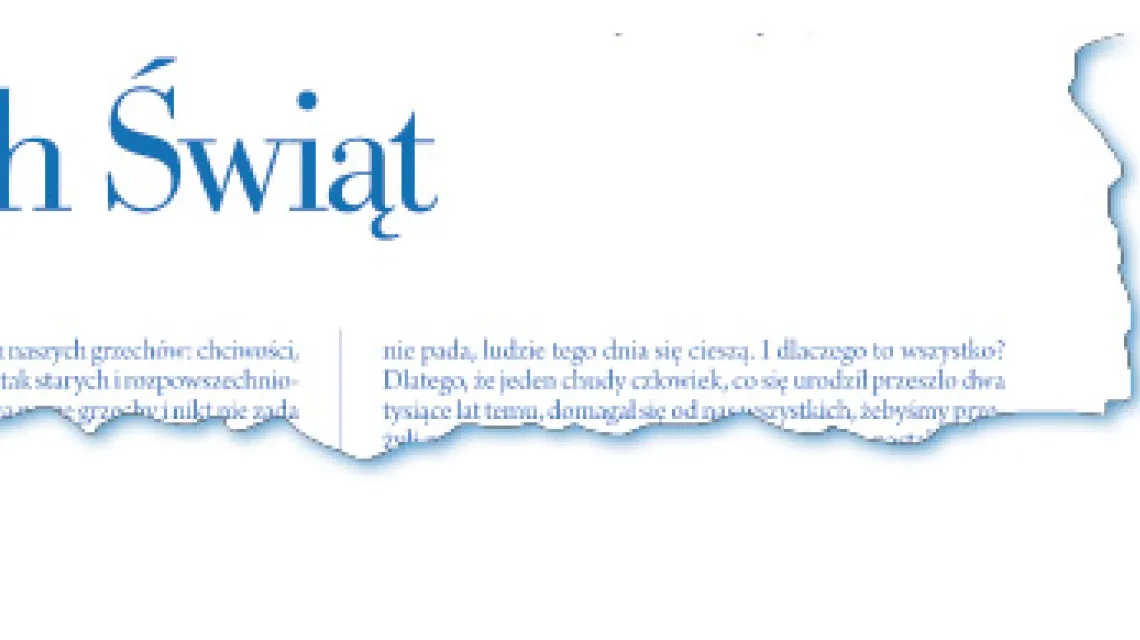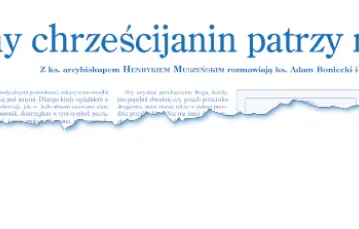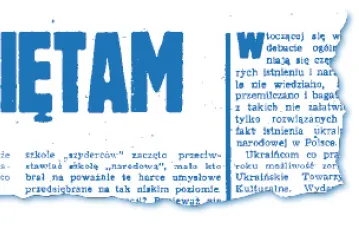Wykupienie dostępu pozwoli Ci czytać artykuły wysokiej jakości i wspierać niezależne dziennikarstwo w wymagających dla wydawców czasach. Rośnij z nami! Pełna oferta →
ETGAR KERET (born 1967) is one of the best known Israeli novelists and film directors. He lectures at the Film School in Tel Aviv University. In 2006, together with his wife Shira Geffen, he directed the film Jellyfish, which received the Camera d’Or prize at the 2007 Cannes Film Festival. In November, he was a guest at the International Joseph Conrad Festival in Kraków. Keret’s text, Christmas Card, was written specially for the Christmas issue of Tygodnik Powszechny (No. 51-52/09).
That guy had an apostle who was very close to him and sold him out. Not that that’s such a special thing, either. Lots of people are sold out by someone very close to them. If they weren’t very close, then it wouldn’t really be considered being sold out, would it? Then the Romans came and crucified the guy. Which, also, isn’t very unique. The Romans crucified a lot of people. And not just the Romans. Lots of other nations crucified and killed lots of people. All kinds of people. Ones who performed miracles and even ones who didn’t. But that guy, three days after they crucified him, was resurrected. And by the way, even that resurrection thing didn’t happen here for the first time, or even the last, for that matter. But that guy, people say, that guy died for our sins. A lot of people die for our sins: greed, jealousy, pride, or other, less well-known sins that haven’t been around for such a long time. People die like flies because of our sins and no one bothers to even write a Wikipedia entry about them. But they wrote one about that guy. And not just any old entry, but a really big one with lots of pictures and blue-coloured links. Not that a Wikipedia entry is such a big thing. There are dogs that have Wikipedia entries about them. Like Lassie. And there are diseases that have entries there, like scarlet fever and multiple sclerosis. But that guy, they say, unlike multiple sclerosis and Lassie, achieved what he achieved through the power of love. Which is something we’ve also heard before. After all, there were those four English guys with the hair and the beards too, just like him, except that they were a little less famous, and they sang many songs about love. Two of them are already dead, just like him. And they, by the way, have a Wikipedia entry, too. But that guy, there was something special about him. He was the son of God. Except that, actually, all of us are God’s children, right? We were born in his image. So, what the hell was it about that guy that turned him into such a big deal? Such a big deal that so many people throughout history were saved or killed in his name?
Anyhow, every year, around the end of December, half the world celebrates his birthday. In many places, it snows on his birthday and everyone’s happy. But even in places where it doesn’t snow, people are happy on that day. And all because of what? Because a skinny guy who was born more than two thousand years ago asked us all to live lives of love and morality and was killed because of it. And if that’s the happiest thing this weird race has to celebrate, then it deserves a Wikipedia entry, too. And actually it’s got one. Go to the nearest computer now. Type in “humanity" and you’ll get the entry. Short. Very short. Not a lot of pictures. But even so. One whole entry on a fascinating and slightly baffling race. A race that could have walked on water and never tried. A race that could have killed all those who believe the world can be a better place and in most cases, made sure to do just that. So, merry Christmas to you, too.
Translated from the Hebrew by Sondra Silverston.
Text published on the Electronic Literature website.









